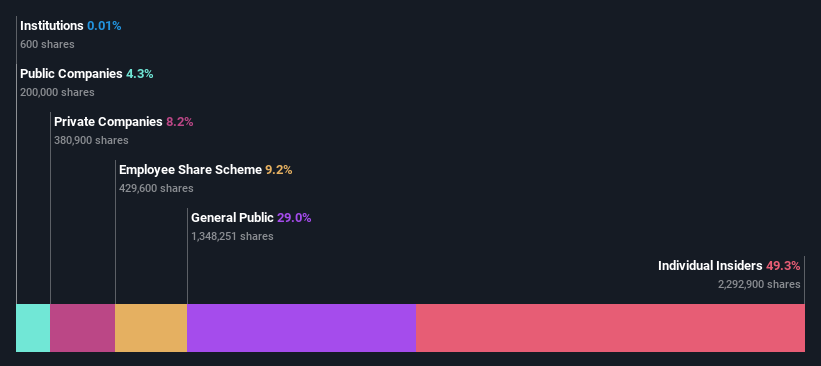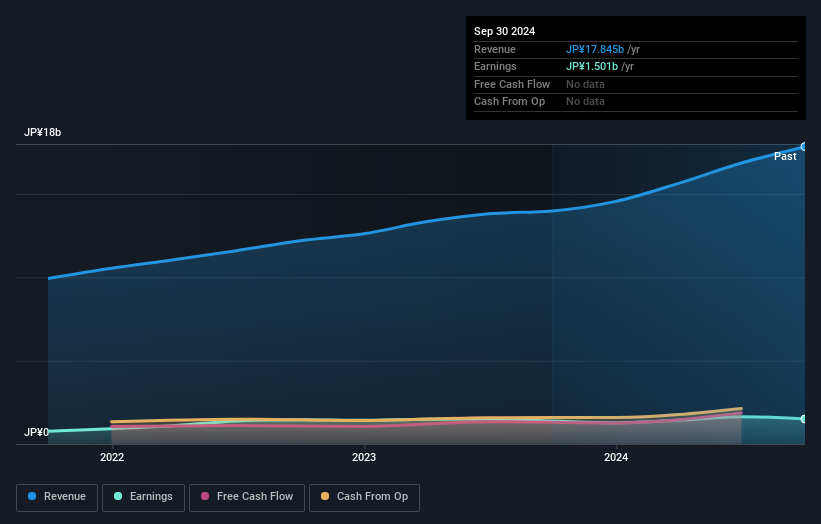- Japan
- /
- Commercial Services
- /
- TSE:6061
UNIVERSAL ENGEISHA Co., Ltd. (TSE:6061) adds JP¥2.1b in market cap and insiders have a 49% stake in that gain

Key Insights
- Significant insider control over UNIVERSAL ENGEISHA implies vested interests in company growth
- The top 2 shareholders own 56% of the company
- Past performance of a company along with ownership data serve to give a strong idea about prospects for a business
If you want to know who really controls UNIVERSAL ENGEISHA Co., Ltd. (TSE:6061), then you'll have to look at the makeup of its share registry. The group holding the most number of shares in the company, around 49% to be precise, is individual insiders. Put another way, the group faces the maximum upside potential (or downside risk).
Clearly, insiders benefitted the most after the company's market cap rose by JP¥2.1b last week.
Let's delve deeper into each type of owner of UNIVERSAL ENGEISHA, beginning with the chart below.
View our latest analysis for UNIVERSAL ENGEISHA

What Does The Lack Of Institutional Ownership Tell Us About UNIVERSAL ENGEISHA?
Small companies that are not very actively traded often lack institutional investors, but it's less common to see large companies without them.
There are multiple explanations for why institutions don't own a stock. The most common is that the company is too small relative to funds under management, so the institution does not bother to look closely at the company. On the other hand, it's always possible that professional investors are avoiding a company because they don't think it's the best place for their money. Institutional investors may not find the historic growth of the business impressive, or there might be other factors at play. You can see the past revenue performance of UNIVERSAL ENGEISHA, for yourself, below.

Hedge funds don't have many shares in UNIVERSAL ENGEISHA. The company's largest shareholder is Takumi Morisaka, with ownership of 46%. For context, the second largest shareholder holds about 9.2% of the shares outstanding, followed by an ownership of 4.3% by the third-largest shareholder. Furthermore, CEO Tsuyoshi Abe is the owner of 0.5% of the company's shares.
After doing some more digging, we found that the top 2 shareholders collectively control more than half of the company's shares, implying that they have considerable power to influence the company's decisions.
Researching institutional ownership is a good way to gauge and filter a stock's expected performance. The same can be achieved by studying analyst sentiments. We're not picking up on any analyst coverage of the stock at the moment, so the company is unlikely to be widely held.
Insider Ownership Of UNIVERSAL ENGEISHA
The definition of company insiders can be subjective and does vary between jurisdictions. Our data reflects individual insiders, capturing board members at the very least. Company management run the business, but the CEO will answer to the board, even if he or she is a member of it.
Most consider insider ownership a positive because it can indicate the board is well aligned with other shareholders. However, on some occasions too much power is concentrated within this group.
It seems insiders own a significant proportion of UNIVERSAL ENGEISHA Co., Ltd.. Insiders have a JP¥8.9b stake in this JP¥18b business. We would say this shows alignment with shareholders, but it is worth noting that the company is still quite small; some insiders may have founded the business. You can click here to see if those insiders have been buying or selling.
General Public Ownership
The general public-- including retail investors -- own 29% stake in the company, and hence can't easily be ignored. This size of ownership, while considerable, may not be enough to change company policy if the decision is not in sync with other large shareholders.
Private Company Ownership
Our data indicates that Private Companies hold 8.2%, of the company's shares. It might be worth looking deeper into this. If related parties, such as insiders, have an interest in one of these private companies, that should be disclosed in the annual report. Private companies may also have a strategic interest in the company.
Public Company Ownership
It appears to us that public companies own 4.3% of UNIVERSAL ENGEISHA. We can't be certain but it is quite possible this is a strategic stake. The businesses may be similar, or work together.
Next Steps:
I find it very interesting to look at who exactly owns a company. But to truly gain insight, we need to consider other information, too. To that end, you should be aware of the 1 warning sign we've spotted with UNIVERSAL ENGEISHA .
Of course this may not be the best stock to buy. Therefore, you may wish to see our free collection of interesting prospects boasting favorable financials.
NB: Figures in this article are calculated using data from the last twelve months, which refer to the 12-month period ending on the last date of the month the financial statement is dated. This may not be consistent with full year annual report figures.
New: AI Stock Screener & Alerts
Our new AI Stock Screener scans the market every day to uncover opportunities.
• Dividend Powerhouses (3%+ Yield)
• Undervalued Small Caps with Insider Buying
• High growth Tech and AI Companies
Or build your own from over 50 metrics.
Have feedback on this article? Concerned about the content? Get in touch with us directly. Alternatively, email editorial-team (at) simplywallst.com.
This article by Simply Wall St is general in nature. We provide commentary based on historical data and analyst forecasts only using an unbiased methodology and our articles are not intended to be financial advice. It does not constitute a recommendation to buy or sell any stock, and does not take account of your objectives, or your financial situation. We aim to bring you long-term focused analysis driven by fundamental data. Note that our analysis may not factor in the latest price-sensitive company announcements or qualitative material. Simply Wall St has no position in any stocks mentioned.
About TSE:6061
Flawless balance sheet with solid track record.
Market Insights
Community Narratives



